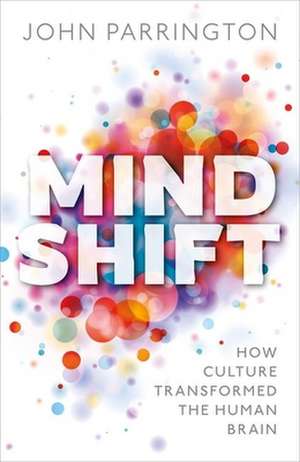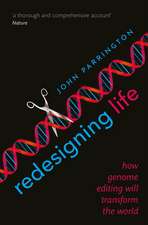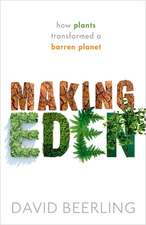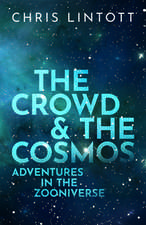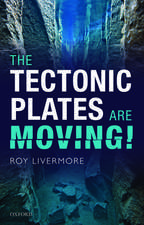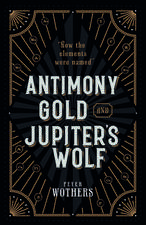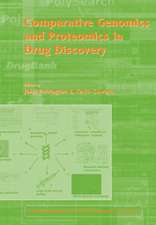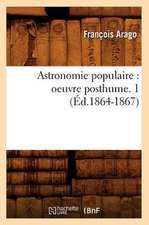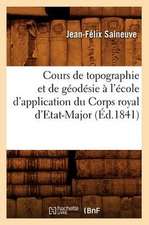Mind Shift: How culture transformed the human brain
Autor John Parringtonen Limba Engleză Hardback – 22 apr 2021
Preț: 157.66 lei
Preț vechi: 198.41 lei
-21% Nou
Puncte Express: 236
Preț estimativ în valută:
30.17€ • 31.50$ • 24.97£
30.17€ • 31.50$ • 24.97£
Carte disponibilă
Livrare economică 03-10 martie
Livrare express 28 februarie-06 martie pentru 85.62 lei
Preluare comenzi: 021 569.72.76
Specificații
ISBN-13: 9780198801634
ISBN-10: 0198801637
Pagini: 544
Ilustrații: 41 black and white images
Dimensiuni: 163 x 243 x 46 mm
Greutate: 0.79 kg
Editura: OUP OXFORD
Colecția OUP Oxford
Locul publicării:Oxford, United Kingdom
ISBN-10: 0198801637
Pagini: 544
Ilustrații: 41 black and white images
Dimensiuni: 163 x 243 x 46 mm
Greutate: 0.79 kg
Editura: OUP OXFORD
Colecția OUP Oxford
Locul publicării:Oxford, United Kingdom
Recenzii
impressive study
John Parrington gives us a very personal take on what it is to be human from the viewpoint of the mind/brain... a genuinely interesting [book]... Parrington's theme is fascinating, and the book is loaded with ideas.
A tour de force that will equally interest both scientists and those who consider themselves over on the humanities side.
John Parrington has already proved himself a master-explainer, transmitting the extraordinary breakthroughs in contemporary science to a non-specialist readership. Now he takes on the big question of the relationship between cultural change and the development of the human brain. The result is a book of remarkable range and empathy, in which readers with a background in the humanities will learn a great deal of neuroscience and those with scientific interests will encounter great cultural riches, as Parrington brings together the theory of play, problems of mental illness and much, much more.
What is it about the human brain that allowed it to take over every corner of the planet? And what does that have to do with language, culture, art, and consciousness? With a keen and insightful eye, Parrington dissects what we know about the mind and rebuilds it into a powerful framework.
John Parrington gives us a very personal take on what it is to be human from the viewpoint of the mind/brain... a genuinely interesting [book]... Parrington's theme is fascinating, and the book is loaded with ideas.
A tour de force that will equally interest both scientists and those who consider themselves over on the humanities side.
John Parrington has already proved himself a master-explainer, transmitting the extraordinary breakthroughs in contemporary science to a non-specialist readership. Now he takes on the big question of the relationship between cultural change and the development of the human brain. The result is a book of remarkable range and empathy, in which readers with a background in the humanities will learn a great deal of neuroscience and those with scientific interests will encounter great cultural riches, as Parrington brings together the theory of play, problems of mental illness and much, much more.
What is it about the human brain that allowed it to take over every corner of the planet? And what does that have to do with language, culture, art, and consciousness? With a keen and insightful eye, Parrington dissects what we know about the mind and rebuilds it into a powerful framework.
Notă biografică
John Parrington is an Associate Professor in Molecular and Cellular Pharmacology at the University of Oxford, and a Tutorial Fellow in Medicine at Worcester College, Oxford. He is the author of The Deeper Genome (Oxford University Press, 2015) and Redesigning Life (Oxford University Press, 2016), and has published over 100 peer-reviewed articles in science journals including Nature, Current Biology, Journal of Cell Biology, Journal of Clinical Investigation, The EMBO Journal, Development, Developmental Biology, and Human Reproduction. He has extensive experience writing popular science, having published articles in The Guardian, New Scientist, Chemistry World, and The Biologist. As a British Science Association Media Fellow he worked as a science journalist at The Times; he has also written science reports for the Wellcome Trust, British Council, and Royal Society, and spoken about science to audiences at national events and festivals.
